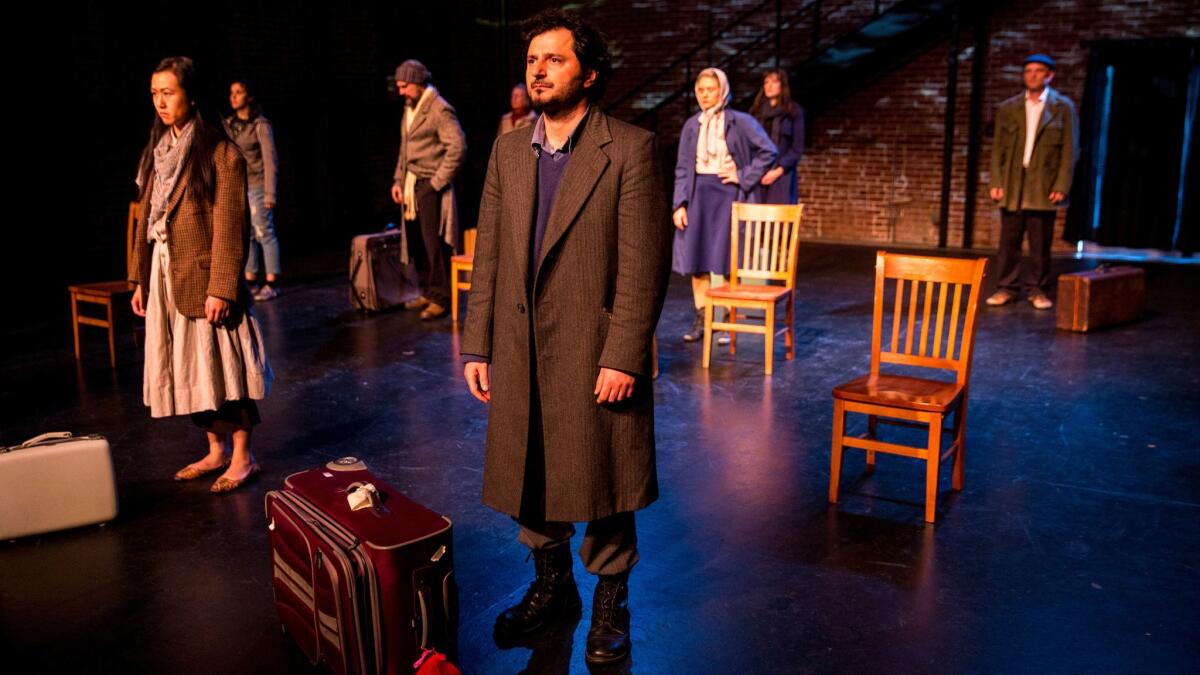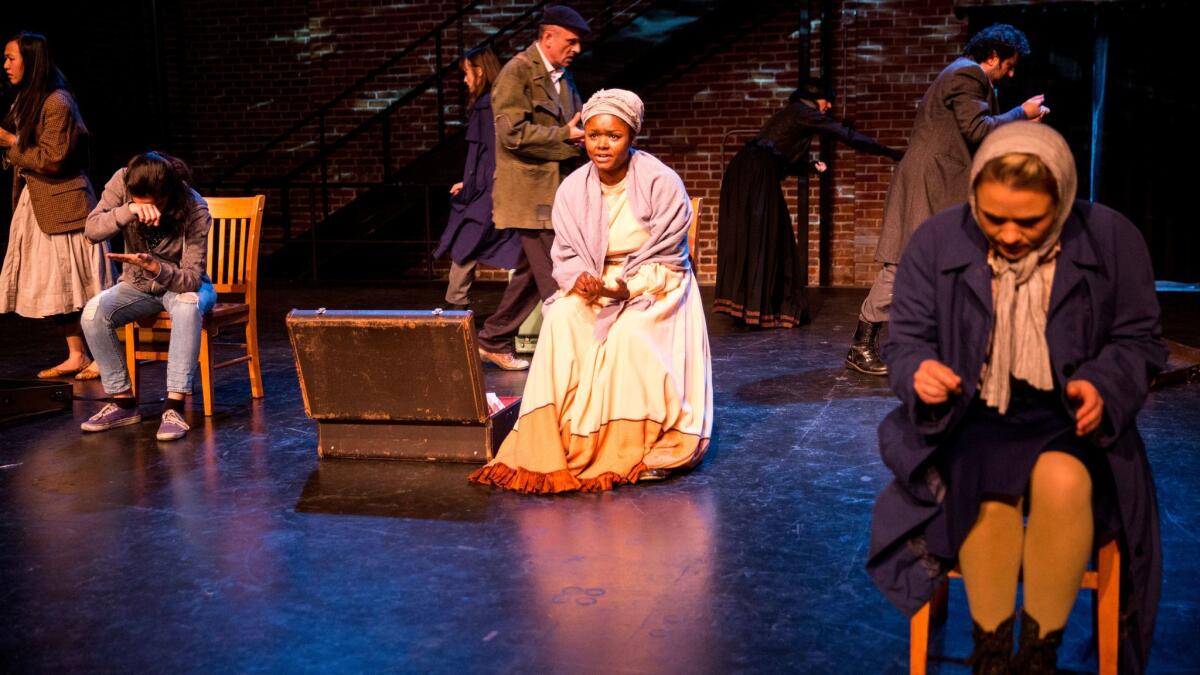Review: The Actors’ Gang’s story of America: The tired, the poor, the huddled masses who bind us all

- Share via
“The New Colossus,” a performance work created by the Actors’ Gang in collaboration with company artistic director Tim Robbins, is inspired by the stories of ensemble members’ ancestors who fled hardships, swallowed losses and risked their lives to become part of the great American experiment.
The title of the piece, which had its press opening last weekend, is borrowed from Emma Lazarus’ poem, which transformed the symbol of the Statue of Liberty into a beacon of welcome to the world’s “huddled masses yearning to breathe free.”
At a time when those in office are cruelly playing politics with the fates of vulnerable, would-be citizens, it’s important to be reminded that America is a land of immigrants. The greatness that President Trump ostensibly wants to return us to is a function of a common ideal rather than nationality, skin color or other accidents of birth.
In the lobby of the Actors’ Gang Theatre in Culver City, there’s a map of the world upon which theatergoers are invited to tag their ancestral origins. Everyone, if you go back far enough, turns out to come from somewhere else.
I had a great-grandparent who made the trip from Sicily, another who came via Canada from Ireland, one who came from Lithuania and still another who came from England. Without them all converging in Brooklyn at the beginning of the 20th century, you’d be reading the review of another grateful descendant of immigrants right now.
A work of physical theater, “The New Colossus” unites the figures portrayed by the 12-person cast into a human bloc. These characters come from different corners of the world and speak in different tongues. The circumstances that brought them here are specific. Their journeys may be more than a century apart. But they all have suitcases loaded with fears and packed with dreams. Together they embody the tenet of e pluribus unum that has made America unique.
Two musicians (David Robbins and Mikala Schmitz) are perched above the action. The grave notes of a cello set the momentous mood. The shadowy outline of a migrant is projected onto the theater’s exposed-brick wall. The setting is at once artful and harsh. These stories are aestheticized though not softened. Every step of every journey seems fraught with doom.
A babbling din rises and falls. So many identities, so many histories. Translation isn’t necessary. The details vary but the sagas are the same.
The actors run in patterns across imaginary borders. Their feverish exertions, gasps and yelps theatricalize a common plight. Characters are identified first by name and age, then by place of birth. Adana, Turkey. Isfahan, Iran. Dalat, Vietnam. Kronoby, Finland. The list includes places you’ve probably never heard of, but even the most obscure regions have altered the ever-evolving national culture.

The performers convey through moistened eyes and expressions of indebted humility just how precious these stories are to them.
The characters call themselves refugees, and whatever the legal definition, you believe them. Together they struggle to keep warm. Their worn overcoats, scarves and gloves seem inadequate protection for their vulnerable humanity. Loud noises cause them to crouch and cower. Naturally, given the hodgepodge of temperaments, they bicker. The sight of a boat stirs the clamorous group. Rescue flickers on the horizon. But the fearsome journey is only beginning.
Directed by Tim Robbins, the production keeps narrative at bay. The research the actors have done into their roots is eventually shared, but the priority is the group identity. Individual voices become momentarily discernible before giving way to other voices. The overlap makes us-versus-them distinctions unthinkable. They are all Americans now.
The theatrical and political context of “The New Colossus” is more stirring than the work itself. The stage effect of this kaleidoscope of bedraggled bodies is powerful at points but also a little monotonous.
The most moving part of the piece is when the actors reveal their relationships to the characters portrayed. This material is deeply personal, no matter how distant. The performers convey through moistened eyes and expressions of indebted humility just how precious these stories are to them.
Robbins joins the cast at the curtain call to ignite a discussion with the audience. The purpose of this brief, gently conducted town hall is to remind us who we are as Americans. Some in the audience fled dictatorships. Others are the children or grandchildren or great-grandchildren of survivors of persecution. Some, like me, were merely the descendants of those who wanted a better life.
No one could doubt that a version of what we just witnessed is how we came to be lucky citizens of this multicultural country. At a time when history is being warped by demagoguery, “The New Colossus” holds a theatrical mirror to the nation.
♦ ♦ ♦ ♦ ♦ ♦ ♦ ♦ ♦ ♦
‘The New Colossus’
Where: The Actors’ Gang Theatre, 9020 Venice Blvd., Culver City
When: 8 p.m. Thursdays-Saturdays; ends March 24
Tickets: $20-$34.99
Information: (310) 838-4264, theactorsgang.com
Running time: 1 hour, 30 minutes
Follow me @charlesmcnulty
MORE THEATER
Dreamers turn out for a mariachi opera whose story sings with familiar sorrow
In ‘Betroffenheit,’ wrenching tragedy becomes an enlightening dance drama
Jeff Daniels to star in Aaron Sorkin’s ‘Mockingbird’ on Broadway
More to Read
The biggest entertainment stories
Get our big stories about Hollywood, film, television, music, arts, culture and more right in your inbox as soon as they publish.
You may occasionally receive promotional content from the Los Angeles Times.











